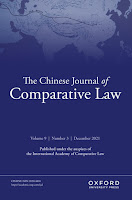Hui Jing
The Chinese Journal of Comparative Law
Published on 6 May 2022
Abstract: In 2016, the Charity Law of the People’s Republic of China (Charity Law) introduced the charitable trust into the Chinese domestic system, with a view to releasing the potential of trusts to promote charitable activities. Drawing upon the failure of public welfare trusts, the new charity law designates special regulators for charitable trusts and endows settlors with extensive powers in the utilization of the charitable trust device. However, the new law on charitable trusts is vague and incomplete in numerous respects. Because of the vagueness of the law, public supervision, and regulatory scrutiny, trust parties might perceive risks in the creation and management of charitable trusts, and such perceptions may in turn motivate trust parties to use contractual tools to allocate such risks among themselves. Through semi-structured qualitative interviews and the study of real-world charitable trust contracts, this article offers a comprehensive analysis of the role of contracts in the regulation of charitable trusts. It explores the main uses of contracts in the field of charitable trusts and the reasons leading to such uses; it also aims to better understand how the scope and function of the legislative framework for charitable trusts is shaped by contractual arrangements between trust parties.

No comments:
Post a Comment